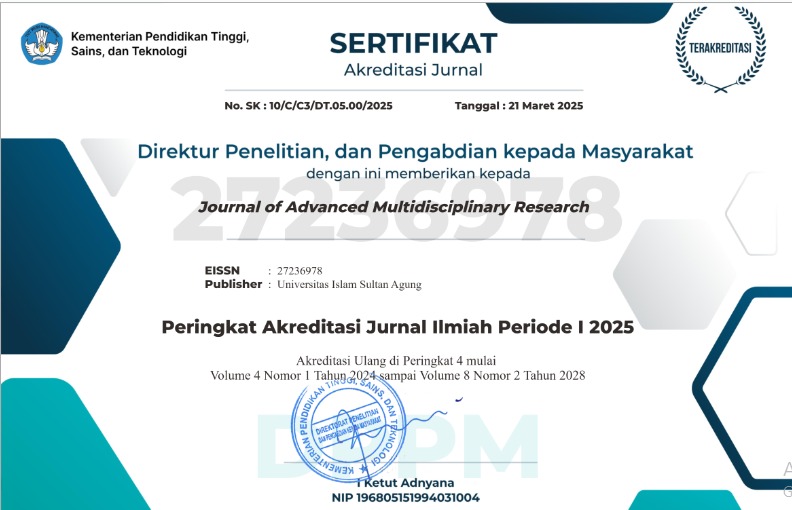Teacher’s Strategies to Overcome Students’ Difficulties When Implementing Time Token Arends Method in Learning Speaking English
Abstract
This study concerned with the teacher’s strategies in learning speaking English. This research is focused on how the teacher overcomes the students’ weaknesses in learning speaking English when implementing Time Token Arends method. By using a descriptive qualitative research within a teacher of MA Al-Bairuny as a subject of its research found that: (1) the student had difficulty in inhibition such as: difficulty in starting to speak because of being worried of making mistakes, difficulty in answering the question from the teacher, and they felt nervous and shy to speak in front of the class. (1) The teacher used “Look in the Face†strategy to overcome the difficulties; (2) the teacher used “Communication†strategies to overcome the students’ difficulties in nothing to say, such as: students had no idea to speak, student got difficulty to express what he wanted to speak, and student had no bravery to express their thought; (3) the teacher used “Interdependence†strategies to overcome the students’ difficulties in un-event participant; (4) the teacher used “Responsibility†strategies to overcome students’ difficulties in mother tongue used, such as: students felt easier for communication each other using Java Language, so they ignored the teacher’s instruction for speaking English; (5) then, after the learning process, teacher made a schedule for this group to evaluate their teamwork process in order to give them motivation and evaluation. Thus, the students’ improvement on their speaking skill has been the aim of the research.
Keywords
Full Text:
PDFReferences
Asmiati, A. (2010). Using Time Token Arends to Improve Speaking Ability to The Second Year Students of SMA Negeri 1 Lilirilau Soppeng. Unpublished thesis. Alauddin State Islamic University.
Brown, H. D. (2001). Principle of Language Learning and Teaching. Englewood Chiffs. Prentice Hall.
Jhonson & Jhonson (2004). Teaching Skills for Cooperation in the Classroom. Journal of Education, Recreation, & Dance, 27-31.
Johnson, D.W., Johnson, R.T., & Stanne, M.E. (2000). Cooperative Learning Methods: A meta-analysis. University of Minnesota, Minneapolis: Cooperative Learning Center. https://www.cooperation.org/pages/cl-methods.html
Lie, A. (2004). Cooperative Learning Method. PT Remaja Rosda Karya.
Moelong, L. (2004). Metode Penelitian Kualitatif. PT Remaja Rosda Karya.
Richards (2008). Learning Speaking Skill for Good Communication. Journal of English and Education, 26-28.
Safitri, A. (2015). Teaching speaking by using Time Token Arends method at the eleventh grade of SMA Wahid Hasyim Tersono, Batang in the Academic Year of 2015/2016. Undergraduate (S1) thesis, Universitas Islam Negeri Walisongo Semarang.
Sukmayati. (2014). Improving speaking ability of the eleventh year students of SMA laboratorium Unsyiah Banda Aceh by using time token arends technique. 36-44. ISSN 2355-004X.
Syukrilahanisa, F. (2014). The Effectiveness of Time Token Arends in Teaching Speaking (Experimental Study at the Eighth Grade Students of SMP Diponegoro 8 Rawalo Banyumas in the AcademicYear 20013/2014). Journal of Education Program of Muhammadiyah University of Purwokerto https://fkip.ump.ac.id/index.php/artikel-skripsi/viewdownload/7-pendidikan-bahasa-inggris/33.
Ur (1996). English Speaking Difficulty faced by Students in Learning Speaking English. Journal of Physical Education, Recreation, & Dance, 121.
DOI: https://dx.doi.org/10.30659/jamr.2.1.1-11
Refbacks
- There are currently no refbacks.
Copyright (c) 2021 Author(s)
Journal of Advanced Multidisciplinary Research (JAMR) is published by Research and Community Service Department (LPPM) Universitas Islam Sultan Agung Semarang, Indonesia.
Address: Jl. Kaligawe Raya Km. 4 Semarang, Indonesia.





